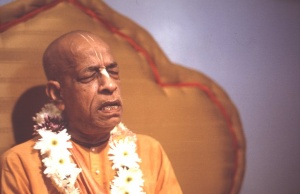SB 8.9.9: Difference between revisions
No edit summary |
(Vanibot #0054 edit - transform synonyms into clickable links, which search similar occurrences) |
||
| Line 24: | Line 24: | ||
<div class="synonyms"> | <div class="synonyms"> | ||
''śrī-bhagavān uvāca'' | ''[//vanipedia.org/wiki/Special:VaniSearch?s=śrī&tab=syno_o&ds=1 śrī]-[//vanipedia.org/wiki/Special:VaniSearch?s=bhagavān&tab=syno_o&ds=1 bhagavān] [//vanipedia.org/wiki/Special:VaniSearch?s=uvāca&tab=syno_o&ds=1 uvāca]'' — the Supreme Personality of Godhead in the form of Mohinī-mūrti said; ''[//vanipedia.org/wiki/Special:VaniSearch?s=katham&tab=syno_o&ds=1 katham]'' — how is it so; ''[//vanipedia.org/wiki/Special:VaniSearch?s=kaśyapa&tab=syno_o&ds=1 kaśyapa]-[//vanipedia.org/wiki/Special:VaniSearch?s=dāyādāḥ&tab=syno_o&ds=1 dāyādāḥ]'' — you are all descendants of Kaśyapa Muni; ''[//vanipedia.org/wiki/Special:VaniSearch?s=puṁścalyām&tab=syno_o&ds=1 puṁścalyām]'' — unto a prostitute who agitates the minds of men; ''[//vanipedia.org/wiki/Special:VaniSearch?s=mayi&tab=syno_o&ds=1 mayi]'' — unto Me; ''[//vanipedia.org/wiki/Special:VaniSearch?s=saṅgatāḥ&tab=syno_o&ds=1 saṅgatāḥ]'' — you come in My association; ''[//vanipedia.org/wiki/Special:VaniSearch?s=viśvāsam&tab=syno_o&ds=1 viśvāsam]'' — faith; ''[//vanipedia.org/wiki/Special:VaniSearch?s=paṇḍitaḥ&tab=syno_o&ds=1 paṇḍitaḥ]'' — those who are learned; ''[//vanipedia.org/wiki/Special:VaniSearch?s=jātu&tab=syno_o&ds=1 jātu]'' — at any time; ''[//vanipedia.org/wiki/Special:VaniSearch?s=kāminīṣu&tab=syno_o&ds=1 kāminīṣu]'' — unto a woman; ''[//vanipedia.org/wiki/Special:VaniSearch?s=na&tab=syno_o&ds=1 na]'' — never; ''[//vanipedia.org/wiki/Special:VaniSearch?s=yāti&tab=syno_o&ds=1 yāti]'' — takes place; ''[//vanipedia.org/wiki/Special:VaniSearch?s=hi&tab=syno_o&ds=1 hi]'' — indeed. | ||
</div> | </div> | ||
Latest revision as of 23:38, 18 February 2024

A.C. Bhaktivedanta Swami Prabhupada
TEXT 9
- śrī-bhagavān uvāca
- kathaṁ kaśyapa-dāyādāḥ
- puṁścalyāṁ mayi saṅgatāḥ
- viśvāsaṁ paṇḍito jātu
- kāminīṣu na yāti hi
SYNONYMS
śrī-bhagavān uvāca — the Supreme Personality of Godhead in the form of Mohinī-mūrti said; katham — how is it so; kaśyapa-dāyādāḥ — you are all descendants of Kaśyapa Muni; puṁścalyām — unto a prostitute who agitates the minds of men; mayi — unto Me; saṅgatāḥ — you come in My association; viśvāsam — faith; paṇḍitaḥ — those who are learned; jātu — at any time; kāminīṣu — unto a woman; na — never; yāti — takes place; hi — indeed.
TRANSLATION
The Supreme Personality of Godhead, in the form of Mohinī, told the demons: O sons of Kaśyapa Muni, I am only a prostitute. How is it that you have so much faith in Me? A learned person never puts his faith in a woman.
PURPORT
Cāṇakya Paṇḍita, the great politician and moral instructor, said, viśvāso naiva kartavyaḥ strīṣu rāja-kuleṣu ca: "Never put your faith in a woman or a politician." Thus the Supreme Personality of Godhead, who was pretending to be a woman, warned the demons against putting so much faith in Her, for She had appeared as an attractive woman ultimately to cheat them. Indirectly disclosing the purpose for which She had appeared before them, She said to the sons of Kaśyapa, "How is this? You were all born of a great ṛṣi, yet you are putting your faith in a woman who is loitering here and there like a prostitute, unprotected by father or husband. Women in general should not be trusted, and what to speak of a woman loitering like a prostitute?" The word kāminī is significant in this connection. Women, especially beautiful young women, invoke the dormant lusty desires of a man. Therefore, according to Manu-saṁhitā, every woman should be protected, either by her husband, by her father or by her grown sons. Without such protection, a woman will be exploited. Indeed, women like to be exploited by men. As soon as a woman is exploited by a man, she becomes a common prostitute. This is explained by Mohinī-mūrti, the Supreme Personality of Godhead.